
How does clearing out your mess clear out clutter depression?
Clutter depression.
It’s not an official term, but here are some very interesting things I learned about mess and depression. It is true that whenever my surroundings disappeared in a general mess, my mind followed. I am not sure which came first. Depression, which made it impossible for me to keep my surroundings clean, or a general inability to keep a handle on my life that facilitated depression.
I like order. Some might say that I am a little obsessive with that. I like things to be organized and put away. The food on my plate is generally separated into sections. Laundry is done as soon as the basket is full. My house is clean and ready for visitors any time. All my books are tagged and cataloged. And I absolutely hate dirty dishes left in the sink or muddy footprints tracking through the house.
Even my cats are not exempt from that. Their feet are wiped with baby wipes and then dried off. If they are just too muddy, their feet get a little bath. Or, if the whole cat is muddy, the cat gets a quick bath as well. Cat hair is cleaned up almost daily. Cat food dishes are sanitized and cleaned regularly. They have fountains because I believe it’s more hygienic than water dishes.
Breaking my order
When my parents came to visit us last year, we definitely had a few discussions about how I like to run my household. My mom and I are very similar in the cleaning department. She is also a neat freak and so we get along great when it comes to the house. My dad really tried to antagonize me because he thought it was funny.
He would intentionally leave the front door open and flies and ants would be everywhere. It’s the countryside, so open doors and windows without screens are a nightmare here. He stuck a beer can into the freezer, which then promptly exploded in there. And while I have a little bit of patience because visitors usually do not stay long, it was a trying time and I could feel myself getting testy.
And there was a good reason for that. I have noticed that my immediate surroundings tend to reflect my inner state. When my living space is neat, I feel in control and balanced. When I lose this control it feels like I am losing control overall. Although this might sound a bit strange to start, I believe it comes from my time battling depression.
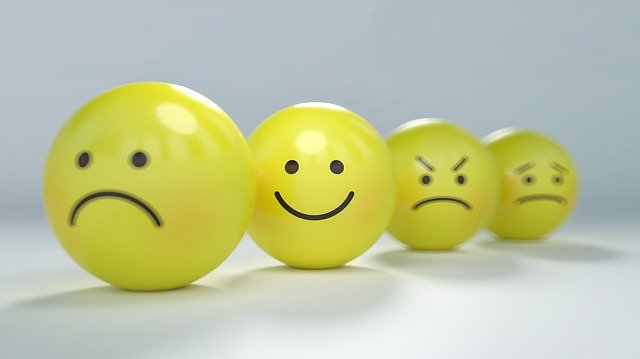
Messy house messy mind?
While I was depressed, I was mostly unable to take care of myself. This included doing laundry, doing dishes, tidying up, organizing, and cleaning. Daily items would start to pile up in the living room, bathroom, or bedroom. Dishes overflowed in the sink. The more I looked at it, the worse I felt.
Literally, the more things piled up, the more unsettled and stressed out I became.
But, for many people clutter can actually trigger anxiety and depression. If left unchecked, clutter can even push you deeper into depression. It’s definitely something to consider, as you are learning about depression and ways to break through it.
“Nothing inspires cleanliness more than an unexpected guest.”
- Radhika Mundra
How is your living space looking? Does walking around your house or condo give you panic attacks because of the clutter? Take a deep breath. Right now, you might be feeling the effects of clutter depression. Although, as I mentioned, it is not an official or scientific term, it is still just as real to the people experiencing it.

How does clutter depression start?
Let’s take a moment and make a quick distinction here. There is a big difference between a messy living space and hoarding. Actually both of these can cause anxiety and contribute to depression; however, one is usually a state of being and the other is a disorder.
I have only ever known one person who is a hoarder. Basically, she felt compelled to keep pretty much everything she ever acquired. This included books, magazines, empty bags, empty food containers, clothes, blankets, shoes, and more. Slowly, her tiny apartment filled up to the brim and it was not possible for her to live in it any more. Through therapy and lots of help from her family, she was eventually able to take her life back.
Hoarding is a disorder and usually needs professional help.
The person generally does not just get better. Cleaning things out causes high levels of anxiety and stress because the underlying condition of hoarding has not been resolved. Sometimes, hoarding can be the result of a traumatic event like a death in the family or a divorce. Other times, hoarding leads to depression because loved ones cannot cope with the situation anymore and have to leave.
The dire consequences
People have lost their family, children, friends, belongings, and jobs over hoarding, so it is a very serious situation. And you can probably understand how this could lead to the person experiencing anxiety, stress, and depression. Hoarders often battle other mental illnesses at the same time and the situation can be extremely difficult and complex.
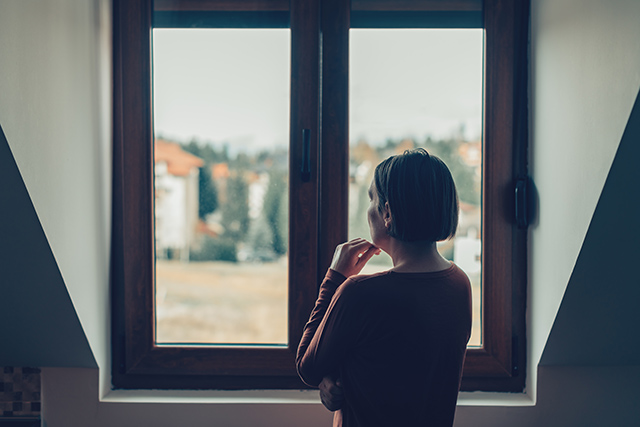
This is one side of clutter depression, but I would consider this one much more extreme than just someone being messy. Most people experiencing clutter depression are not hoarders. I was not a hoarder and I did not experience any other mental illnesses. Messiness became an extension of my depression and that is the type of clutter depression I am referring to in this post.
My messiness seemed to have a lot to do with control. Whenever I lost control over my life to depression, I also lost control of my ability to “organize”. Because the brain fog wore me out, kicked me down, and made me so tired, I was not able to function. Part of the function I lost was the ability to clean and do basic housework.

Why does clutter make us depressed?
The more you read online, the more you come to understand that mess can trigger anxiety and depression. But why and how? Here are a few of the things I learned about clutter and how it affected me.
Too much
The basic point of the clutter was that it was too much. When I was battling depression, I did not deal well with stimuli. I didn’t like bright lights, a loud TV, or a smelly dinner. When my senses were overloaded, I could not cope and would retreat in a panic. This also happened in crowds with too many voices, or on a busy street with too much car noise.
This is the same way clutter triggered me. When I came home to a sink full of dishes, the smell was just too much. The towels and clothes around the house were never ending piles of colors and shapes. At every corner my senses were assaulted with something out of the ordinary and it was just too much.
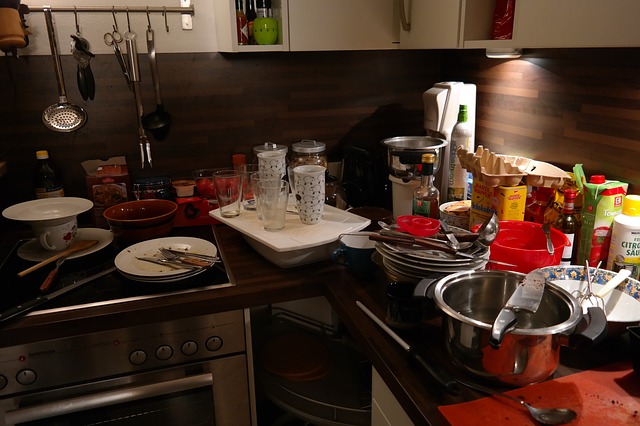
The constant reminder
The mess was also a constant reminder that I was not doing my job. I was not cleaning and taking care of things. One look and I could feel my anxiety skyrocketing. The clutter was a real-life picture of my failure to function. Whereas I had relatively little to do, I have spoken to moms and dads who were just completely overwhelmed by the state of their living space every day.
The sink sat full of dishes, the living room looked like a war zone, the dirty laundry piled up in every room, and they simply could not find the energy to do anything about it. With every passing day, their anxiety grew, as they had to look at the things waiting to be done. Without exception, they all said that the inability to do basic tasks around the house wore at them mentally in a big way.
Monkey brain
For me, it is extremely hard to focus when I am depressed and anxious. Every little task takes so much effort and energy and what people can complete in an hour, takes me twice as long or all day in this state. It is not surprising then that clutter does not help with monkey brain. The ability to focus is challenged even more by clutter.
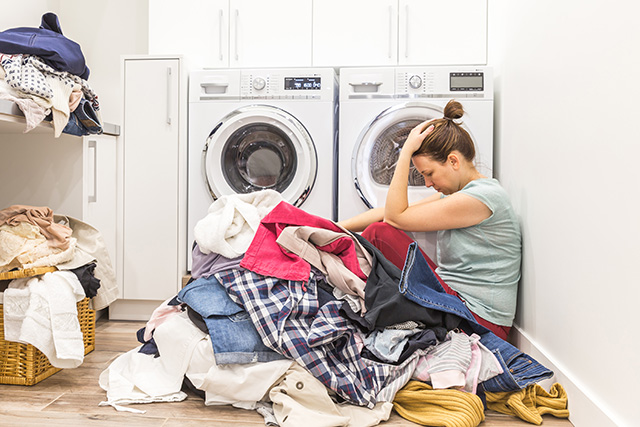
I would try to set myself tasks every day, in an effort to feel at least some sense of control over my life. The problem started when I tried to catch up things that had gotten out of hand in my basement suite. As I tried to start with the first thing on my list, I saw the dishes, the pile of recycling, or my clothes all over the floor and my monkey brain lost all focus on what I was supposed to be doing.
Creative block
This leads right into the fact that because clutter constantly triggers me, my productivity and creativity really suffer. Instead of finishing certain tasks, I get side tracked by all the stuff lying around. So in the end, I just get so overwhelmed that I don’t finish anything. I am basically frozen in a state of anxiety in addition to being depressed.
This makes it nearly impossible to find any creativity to help me relax and unwind. Clutter in itself seems to really perpetuate a cycle of anxiety and depression because I see the clutter, my mind flips through all the things I need to do to get rid of it, I get overwhelmed, I shut down and the clutter grows even bigger and the cycle starts again.
Mental exhaustion
So not only does clutter push my anxiety and depression buttons, it also keeps me from relaxing. As my mind is occupied by the mess, I am not able to do anything else to help me break through my mental state. If I try to watch TV, I see the pile of dishes in the kitchen and feel guilty. If I just decide to go to sleep, wading through the dirty laundry is another reminder of what I should be doing instead.
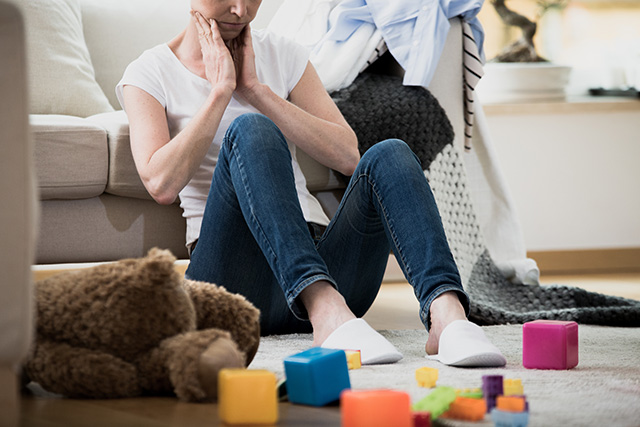
My brain cannot shut off and my mind is stuck on how I will possibly ever get this situation under control. Task after task comes up in my mind and the never-ending to do list pushes my anxiety even further. There really is no escaping clutter in your own home and you are stuck staring it in the face every single day.
The no visitors rule
I also started acting a little strange when I was drowning in clutter because I did not want my family and friends to see my home like that. I felt embarrassed and ashamed on top of being exhausted and followed a strict no visitor rule. You can imagine what kind of consequences that had. It added to the isolation I was already experiencing and my friends and family started to wonder what the heck was going on at my place.
When you have children who want to have their friends over, it can add even more pressure that you don’t want others to see your place like that. A lot of families I spoke to also explained that their children were actually embarrassed to bring anyone over, which made them the target of many negative experiences at school. As simple as a mess might sound to some, it can absolutely have far-reaching consequences for people with clutter depression and their families.
Sorting through piles
And yes, it also frustrates the heck out of me when I cannot find something I need. Sometimes I would spend hours sorting through piles because I could not find something I needed for school, my clothes, my shoes, my car keys, or my phone. Often, I just gave up because finding what I needed just required too much energy that I simply did not have.
Trying to find anything in a mess can be a huge undertaking and waste a lot of time. When we are already unfocused and exhausted, it just adds to the long list of things we failed at and feel inadequate over. In the end, it usually leads to a mental shut-down and increased levels of anxiety and depression, which is not helpful.

Cleaning out clutter depression
Did I finally just “snap out of it” and clean my place up? Actually, no. And I don’t think it quite works like that. My family and friends started becoming very suspicious of what I was hiding at home. My best friend had a key and when the situation became worrisome, she let herself in. It did not take her long to realize that the clutter was not a normal situation for me.
My family and friends took charge of the situation and helped me sort out the mess. It was clear that I was simply not able to cope in the state I was in. They took turns coming to my place to help with keeping order, until I became well enough to take over some things myself. And that might be the solution that works for you as well.

Lending a helping hand
The first step will be asking for help. Whether that is admitting to family and friends what is happening, or asking for professional help from a doctor or counselor. The reality is that asking for help when you cannot cope is nothing to feel ashamed or guilty about. The only thing I can tell you is how a huge weight was lifted off my shoulders when my family finally found out and I truly wished I had said something earlier.
If you can get help with cleaning the house and having someone lend a helping hand with basic household tasks or minding your children, you will notice that you finally have some space to heal. The clutter won’t be staring you in the face anymore and you can work on healing what needs to be healed.
Too exhausted to catch up
In my situation, there was no way I would have eventually just caught up on everything and I think it is like that for most people. In the mental state I was in, the clutter would have just grown every day and I honestly do not know how it would have ended. That’s why I believe it is so important to ask for help and support.
Yes, at first it is scary to admit something is wrong because you feel the guilt of not being able to function like a normal human being. Just remember that we all experience life in different ways and there is no failure to “be normal”. Your experience is different than someone else’s and there is nothing wrong with that. Life gets overwhelming sometimes.
I really encourage you to share and talk about it, so you can get that massive boulder lifted off your chest. Although you might not feel like you need professional help because you are not a hoarder, there is nothing wrong with getting a helping hand to take some of the pressure off your shoulders. You will start to feel the relief pretty much instantly.


The Takeaway
After my experience with clutter depression, it is clear that all clutter is not the same clutter. Life happens and things sometimes get a little messy. We don’t have time to do the laundry right away, or the dishes sit out overnight. The odd legendary party also wreaked havoc on the state of my home. Some people are naturally a little more messy than others and thrive on it. Some of my friends call this organized chaos and they live with it just fine.
The difference is that with clutter depression, we are not able to catch up on the mess and the situation actually impacts our ability to function in everyday life. We do not cope well with the effects of seeing the clutter every day and the chaos does not inspire us. Clutter depression also perpetuates depression and anxiety, which can lead into a vicious cycle of things becoming worse and worse.
There is still a difference to hoarding, but clutter depression can lead you on the road to hoarding. For both, there are real, mental issues involved that need to be resolved and healed. There can be a specific trigger, like the death of a loved one, but often with clutter depression there does not seem to be one specific trigger.
In my situation, I was fully aware that there was a problem, but I did not have the mental bandwidth or the energy to deal with it. I was not sure how the situation would be resolved, which added to my anxiety, but I simply could not do anything about it. Losing control over my living space like that had a lot to do with my mind descending into depression as well.
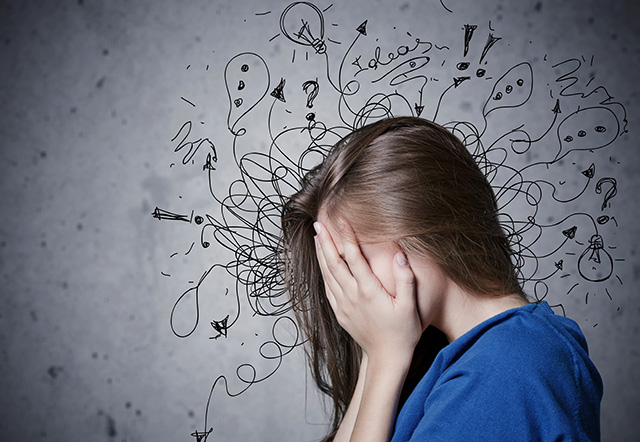
Let yourself be helped
This might sound strange, but a big part of what prolonged my clutter depression was my inability or unwillingness to ask for help.
I could have started on the road to healing much sooner, had I asked for help.
Especially many of the new moms I have spoken to have pointed out that the change after birth can be quite drastic and play a role in clutter depression. In addition to dealing with the hormonal changes, they have to now care for one or more children. It is no surprise that household tasks can become overwhelming, as space for themselves becomes virtually non-existent. There are not even five minutes in the day to sit down, relax, and take a breath. Clutter takes over and daily anxiety increases dramatically.
However clutter depression starts to manifest for you, remember that you do not have to cope with it all by yourself. Share with your family or friends, or even in online and local support groups. I found the biggest help was for someone to take the organizing and cleaning tasks off my hands, so I finally had space to breathe and let my mind heal. Once the daily tasks were removed, I had time to figure out and resolve the underlying issues, which for me included depression and anxiety.

With time, you will be able to take back control and organize your tasks and your home. Clutter depression does not have to be a permanent situation. It takes time, support, and figuring out the underlying issues triggering the situation, but it is completely possible to break through it.
Take a breath and realize that all your perceived imperfections are exactly what makes you perfectly perfect!
